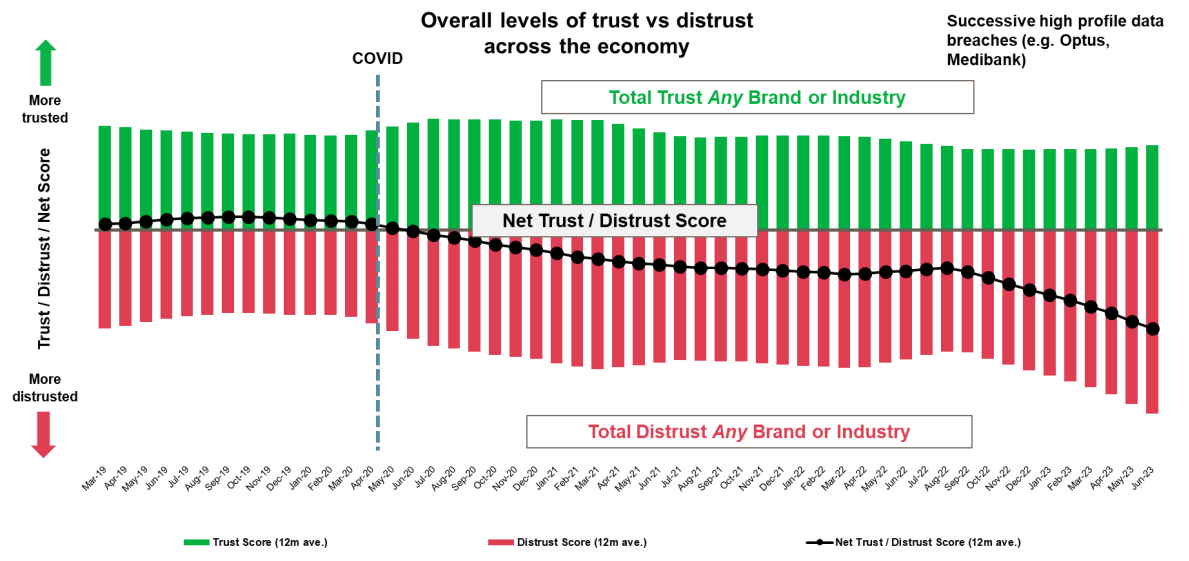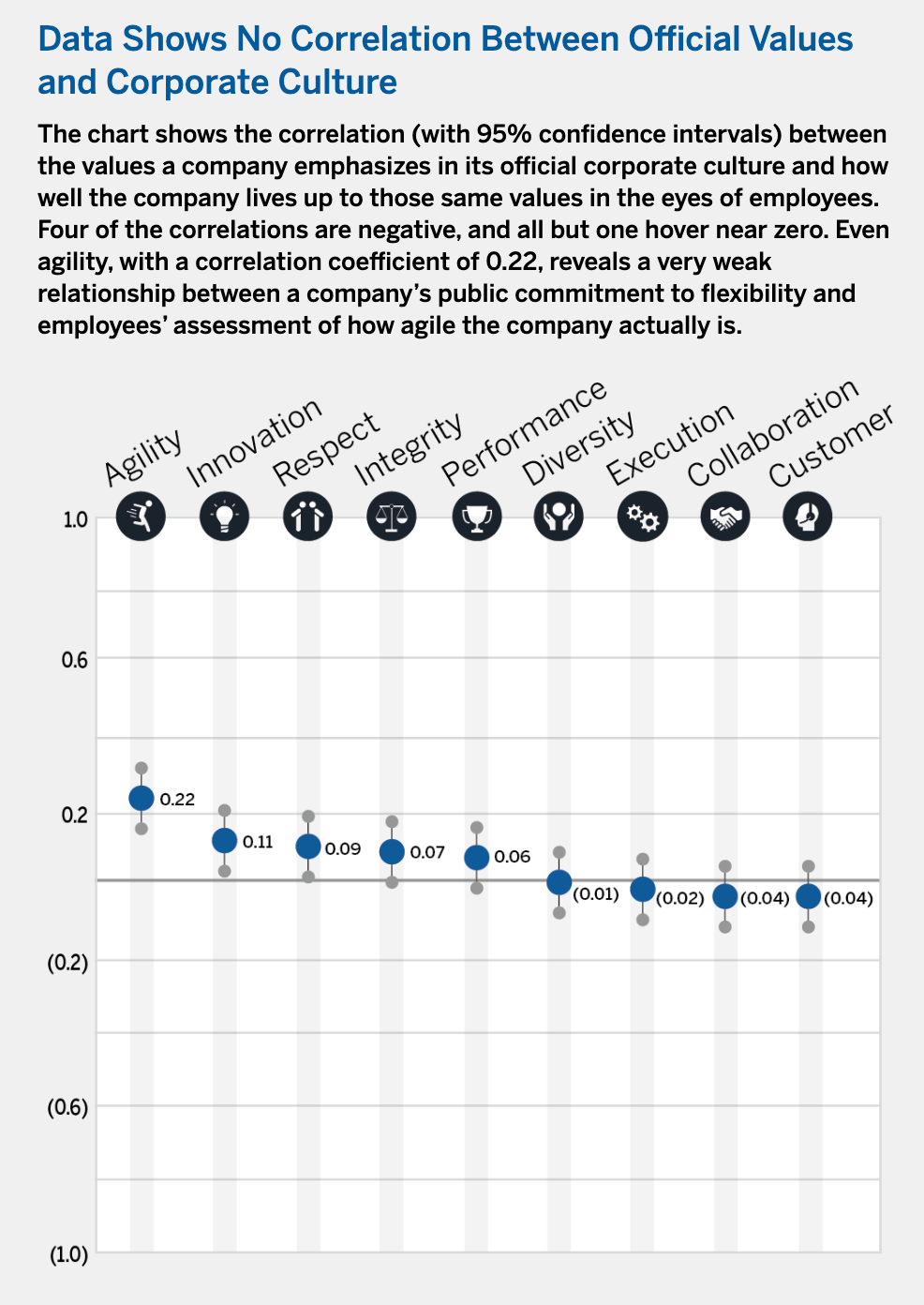The graph you see above comes from Roy Morgan’s latest net trust research (brief overview from ABC here). As I’ve called out before, we have to be cautious about over relying on such methodologies. With that said, there is absolutely something too this.
Corporations fly high with posters on the wall and all kinds of statements that seek to express their virtue. The problem is that ‘the ethical intent to action gap’ - the massive delta between what corporations say they value and how that translates to culture and behaviour - is huge. It’s everywhere. And there’s very little evidence of change.
In short, the ol’ virtue signal seems to be the BAU play. And, if these attitudinal assertions about distrust have legs (Roy Morgan research above), folks are bloody sick of it. They want, expect and deserve better.
Now, I sympathise with the folks responsible for corporate governance, at least up to a point. They’re stuck in a system that legally mandates they maximise shareholder value. This has deep metaphysical and ideological underpinnings that few seem to have taken the time to intently study (the actual history of capitalism, sociological and ecological implications of the Western Enlightenment, the big assumptions that are made about the nature of being, specifically ‘human nature’ etc.) period. As a result, there are embodied assumptions (things people believe to be true, without knowing why, where it comes from etc.) that go unchecked. This makes it extremely challenging to meaningfully surface the invalidity of said assumptions.
This whole can of worms is not for this post. That is a series of books, and much has been written about that already. Before moving forward I will briefly suggest that all of this, the context that gave rise to corporations, the system within which they operate, and the ways that this actually plays out in practice, has led to many assertions (both in the scholarship and beyond) that corporations, if judged as ‘persons’, could be considered psychopathic.
Now, we ain’t gonna change ‘the system’ overnight (even though its abundantly clear that this has to happen. 6 of 9 planetary boundaries now transgressed. If you don’t know what this means, Google search away! From my recent conversations with scholars in this space, they think it’s likely that at the very least ocean acidification is also beyond the safe operating zone. So it might be at least 7. Basically there’s insurmountable evidence we are destroying the habitability of the planet), so what actions can we start taking in the here and now?
First I’ll suggest a little education, starting with the below.
Leaders need to take the time to understand this ‘stack’.
Here’s the gist: The living and breathing the process of doing ethics - stepping back and assessing, relative to the choices available to you, which pathways forward are most good and right - enhances the qualities of trustworthiness. People’s assessment of an organisation’s trustworthiness influences trust states (this is not the only thing that influences trust, but I’ve covered that elsewhere). This belief (trust) directly impacts what people say (reputation). What people believe and say, situated within the broader dynamics of the system, impacts an organisations Social License to Operate (SLO). SLO is basically essential for an organisation to sustain itself healthily.
In my experience, working up, down and around this stack is something very few organisations have the expertise to do. This is why folks like me can put bread on the table.
But, I’d like to argue that this has to become a core competency. This whole process is how organisations can exemplify the qualities, or organisational ‘features’, of trustworthiness (from TIGTech’s review of the literature a couple of years back).
This is how corporations can help create the relational conditions for people outside of their organisations to place intelligent trust judgements.
If the organisation has done darn good, deeply intentional work, it’s likely that trust states will improve.
When trust states improve, everyone can basically benefit (nuance to all of this. I’m keeping this brief).
So, leaders need not bury their heads in the sand. Let’s leave that to our Ostrich compadres. Instead, they should ‘lean into’ this challenge, commit to doing the hard work, learn and engage out in the open and be part of an organisational transformation that makes ethics and designing features of organisational trustworthiness the new BAU.
If you’re ready to move beyond, as Sull et al. highlighted, the seemingly empty statements, let’s talk.









Don't forget the interactions between Planetary Boundaries too!
https://twitter.com/LeonSimons8/status/1702322182192607357
The above one is actually super interesting from a sociotechnical ethics point of view and the proximate cause (SO2 shipping emissions reductions by the International Maritime Organization). An ostensibly morally "good" choice at first order, but potentially disastrous at 2nd and 3rd orders (plus badly timed with El Nino and the Hunga Tonga eruption this year which injected ~megatons of water vapour into the stratosphere).
Situating non-arbitrary, value-informed decisions within a stochastic and unpredicatably complex world may seem like an intractable problem, but I suspect that both your work here re: trustworthiness, plus some other high-octane applied philosophy (looking at you, neo-Aristotleanism multiplied by post-Anthropocene scholarship) could provide sociotechnical praxis *vectors*, through which we may guide action on the ground.
Ultimately this is probably equivalent to something like systems wisdom, or some fancy/fun neo-phrase. The quixotic conundrum here arises though that within any given context (bioregion, company, etc.), per much of what Nora Bateson writes about, the very terms we use in such transcontextual playing fields become objects of play and/or consternation.